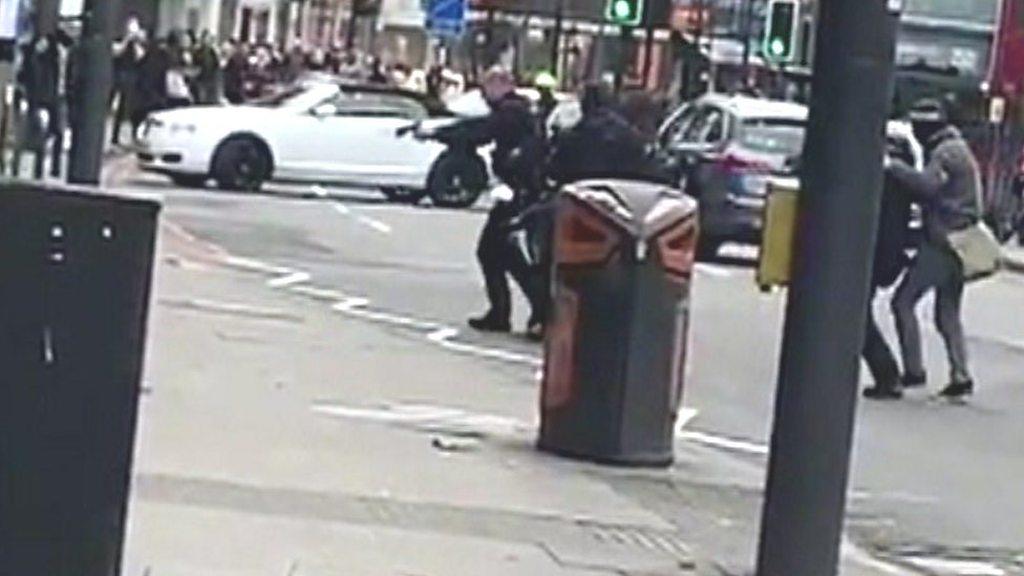Streatham attack: Police search homes as attacker Sudesh Amman named
- Published
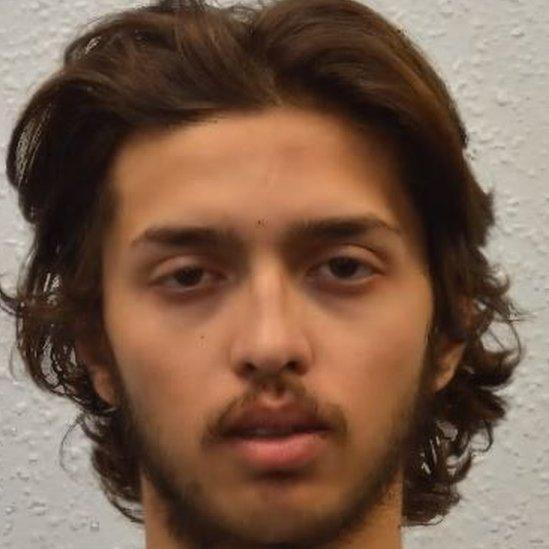
Police have been searching the London hostel where the Streatham attacker is believed to have been living.
Sudesh Amman, 20, was shot dead by police on Streatham High Road after stabbing people in what police called an Islamist-related terrorist incident.
He had been released from prison about a week ago after serving half of a sentence for terror offences, and was under police surveillance.
Three people were injured but none is in a life-threatening condition.
Scotland Yard said officers were searching residential addresses in south London and Bishop's Stortford, Hertfordshire.
On Monday, officers were seen cordoning off a hostel in Streatham, where the manager said Amman had been living. He added: "I didn't have much to do with him.
"Everyone has their own rooms in there. The last time I saw him I was doing his radiator, setting up his heating on Friday. He didn't speak much."
Amman's mother, Haleema Faraz Khan, told Sky News that she had visited her son, external on Thursday, when he seemed "normal", and that they spoke on the phone just hours before the attack.
She fought back tears as she said her "polite and lovely boy" had been "brainwashed" by material he saw online and further radicalised by his time in the high security Belmarsh prison in south-east London.
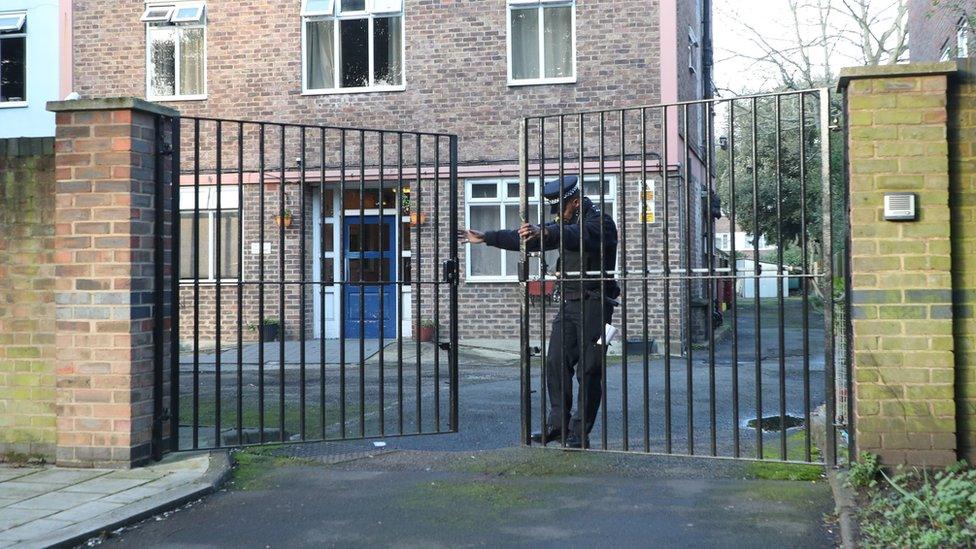
There is a police presence at a hostel in Streatham
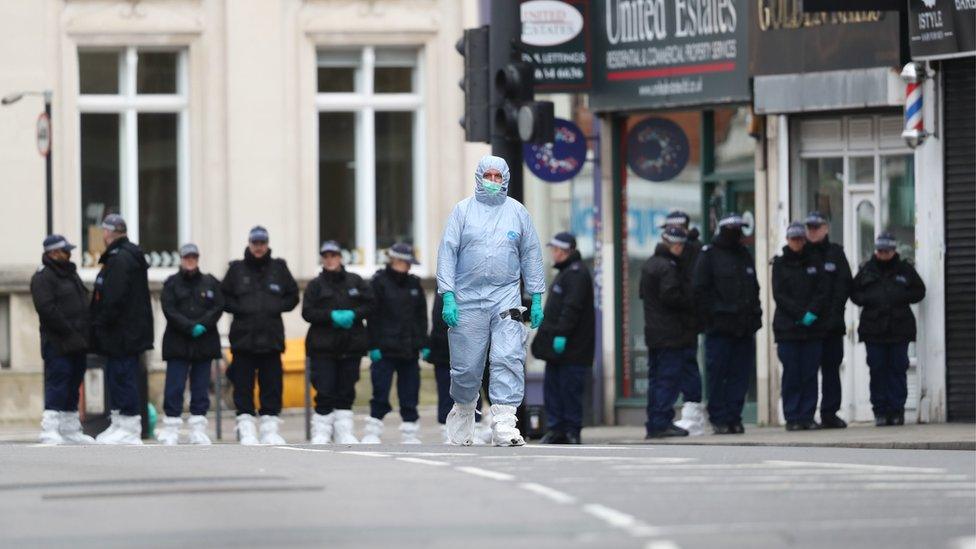
Streatham High Road remained shut on Monday, with enhanced police patrols
In Bishop's Stortford, neighbours said two police vans were outside a semi-detached house in the early hours of the morning.
The Met Police, whose Counter Terrorism Command officers are leading the investigation, said no arrests had been made and "inquiries continue at pace".
London Mayor Sadiq Khan said there were about "70 plus" people convicted of terrorism offences who had been released, and called for reassurances from the government they were being "properly punished and reformed".
He said prisons are "warehouses" for radicalisation, where people "learn more things from a university of crime rather than being rehabilitated".
Prime Minister Boris Johnson said there were problems with the rehabilitation of those convicted of terrorist offences, saying: "It's very, very hard. It can happen that the instances of success are really very few, we have to be frank about that."
He said new laws would scrap automatic early release from prison for terror offenders, the "difficulty is how to apply that retrospectively" for those currently serving sentences.
How did the attack unfold?
At about 14:00 GMT on Sunday, two people were stabbed on Streatham High Road in south London, a busy street lined with shops.
Witnesses heard gunshots as armed officers, who had been following Amman on foot, shot him dead.
Video shows moments after police shooting
Amman had what appeared to be an explosive device strapped to his body, police said, which was later discovered to be a hoax.
Three people were taken to hospitals including the two stabbing victims - a woman in her 50s and a man in his 40s. The man was initially considered to be in a life-threatening condition, but that is no longer the case. The woman has been discharged.
Another woman in her 20s had minor injuries believed to have been caused by glass following the gun shots.


Eyewitness Dave Chawner told BBC Radio 4's Today programme he heard the shots and then turned around to see one of the stab victims lying on the floor "who was incredibly distressed".
"He was holding his lower right quadrant and there was blood everywhere. I happened to have a blanket in my bag and I gave it to them to help stem the bleeding."
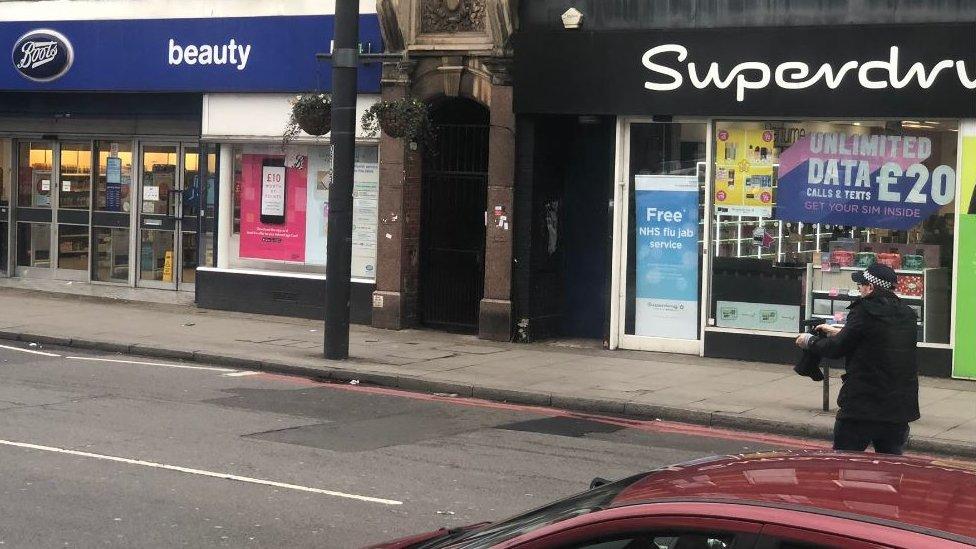
A police officer was seen pointing a gun at a man, who was seen on the ground outside Boots
Who was the attacker?
Amman was released from prison in January, after serving half of his sentence of three years and four months.
He was jailed in December 2018 after pleading guilty to terror offences.
The Islamic State group has said Amman was a "fighter" of the group. This is the wording IS commonly uses in the case of attacks in the West that the group appears to have inspired rather than orchestrated.
A teenager who knew Amman from his neighbourhood in Harrow, but who did not want to give her name, said he used to talk about being a terrorist, but she and others thought he was joking.
But Jignesh Khomani, 20, a former neighbour of Amman, said he seemed "a pretty average guy".
At the time of Amman's release, there were concerns about the danger he might pose to the public but there were no legal mechanisms to keep him in prison, said BBC political correspondent Chris Mason.
Last November, an attack near London Bridge - in which two people died - was also carried out by a man convicted of terrorism offences but who had been released mid-way through his sentence.
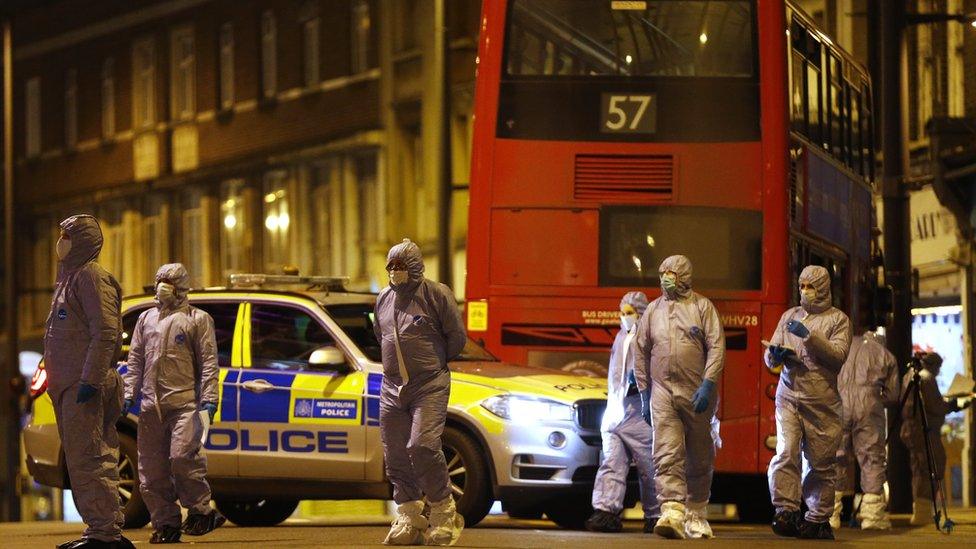
People who live locally spoke of their shock at the attack having taken place in Streatham
Mr Khan, the London Mayor, said he was "angry" because both the attack in Streatham and the one in London Bridge were "preventable and foreseeable".
He blamed the government's abolition of the Imprisonment for Public Protection regime, which meant that now "judges haven't got the tools they used to have to keep people in prison longer who are still a danger to the public".
What has been the government's response?
Our correspondent Chris Mason said there was "a desperate desire" within government to be seen to be acting quickly.
Mr Johnson said on Monday the government would announce further plans for "fundamental changes to the system for dealing with those convicted of terrorism offences".
The planned changes mean automatic early release from prison will be scrapped for terror offenders, and there will be a minimum jail term of 14 years for serious terror offences.
Jonathan Hall QC, the independent reviewer of terrorism legislation, said the government might intend to revive post-9/11 civil powers to detain individuals.
That would mean people who were considered to be a risk but had not committed an offence could be detained, he told the BBC's Victoria Derbyshire programme.
How many other people are in prison for terror offences?
Overall there were 224 people in prison for terror-related offences in Britain at the end of September. The majority are Islamist extremists (173), and there are also 38 far-right extremists.
Currently, most people convicted of terror acts will not serve all of their sentence in jail.
For almost all prison sentences (terror-related or not), some of the time will be spent outside jail in order to allow some rehabilitation back into the community.
What issues has this attack raised?
There would be inevitable questions about the operation, said BBC home affairs correspondent Tom Symonds.
He said: "Preventing terrorism is all about taking difficult decisions. Which suspects should be watched? What level of risk do they pose and when is the best time to make an arrest, given the need to capture real evidence?
"Those decisions have become harder in recent years as would-be attackers are increasingly likely to act alone and to use low-tech weapons, sometimes on a whim."
Deputy Assistant Commissioner Lucy D'Orsi said armed officers were in "immediate attendance" after the attack
David Merritt, whose son Jack died in November's London Bridge attack, said that without effective rehabilitation, the government's plans for longer terrorism sentences would only allow prisoners to radicalise each other, external and "build greater resentment".
But former military intelligence officer Philip Ingram told BBC Radio 5 Live it was "right and proper" that the government should assess the laws in place.
"You have to ask the question as to whether some of them may not ever be able to be rehabilitated and, therefore, is the law we have at the moment right and proper to keep the public safe?"
Police are appealing for information, images and footage of the incident which can be shared via www.ukpoliceimageappeal.com or on 0800 789 321.

Do you have any information to share? Get in touch by emailing haveyoursay@bbc.co.uk, external.
Please include a contact number if you are willing to speak to a BBC journalist. You can also contact us in the following ways:
WhatsApp: +44 7756 165803
Tweet: @BBC_HaveYourSay, external
Send pictures/video to yourpics@bbc.co.uk, external
Please read our terms & conditions and privacy policy
- Published3 February 2020

- Published2 February 2020
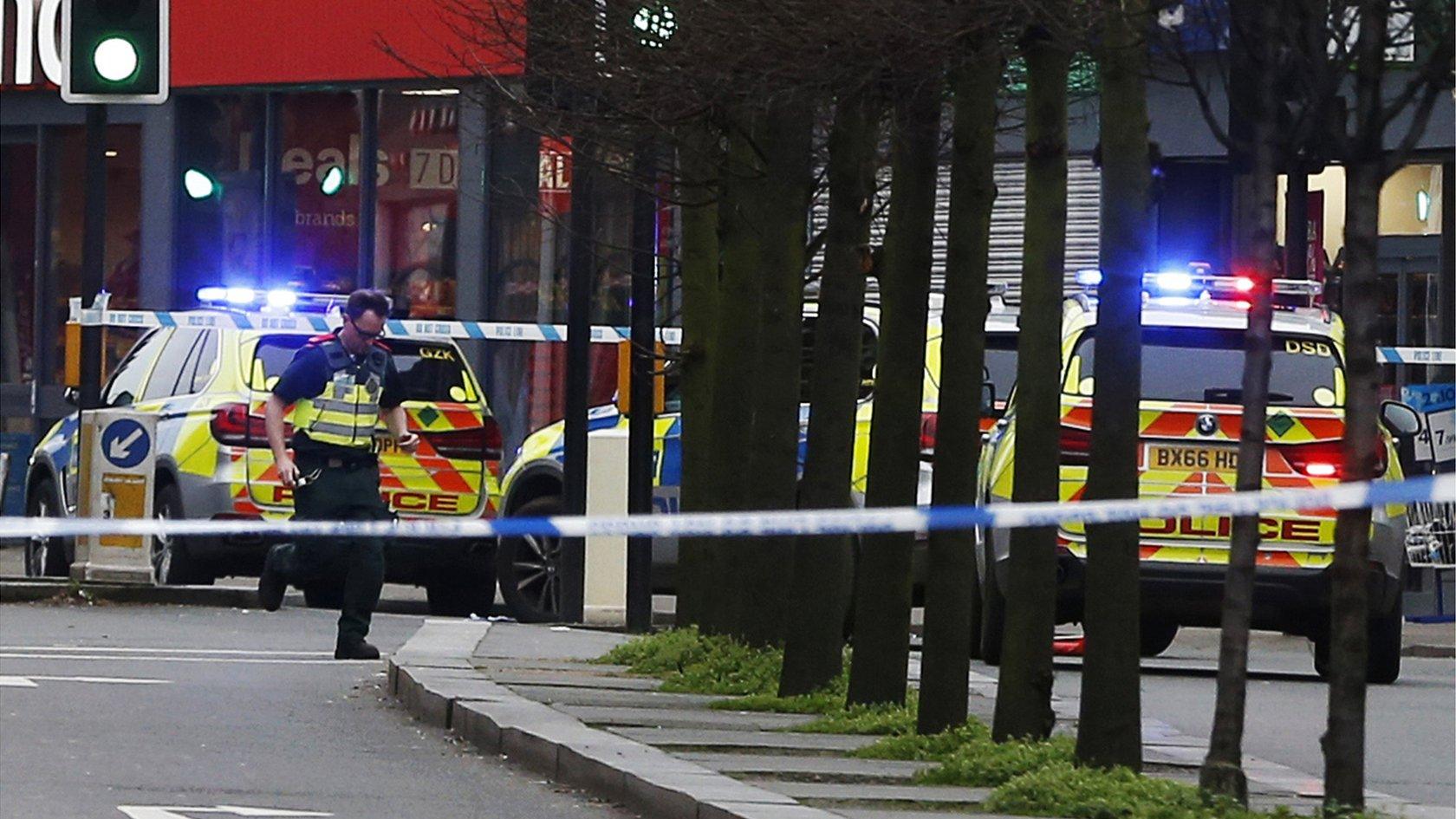
- Published2 February 2020
